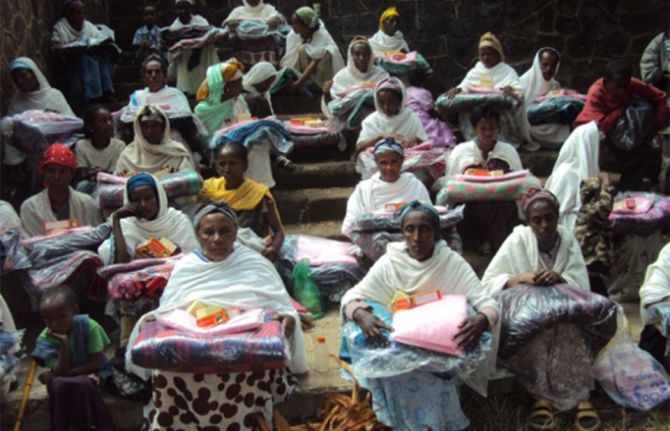


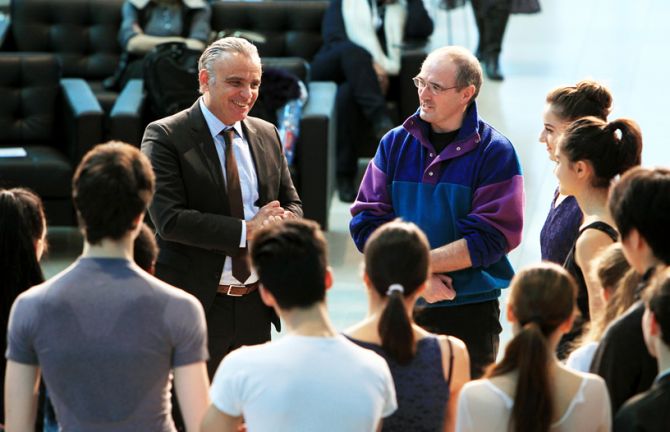
Update
The Rudra Béjart School dances at UNAIDS for gender equality
06 March 2015
06 March 2015 06 March 2015The Rudra Béjart School of Dance Lausanne has given a special performance at UNAIDS headquarters in Geneva, Switzerland, to celebrate International Women’s Day.
The specially choreographed performance by 38 dancers from 15 countries was a powerful visualization of young people’s strength, innovation and unity—qualities that are essential to advancing gender equality and Fast-Tracking the end of the AIDS epidemic by 2030.
The event was attended by more than 200 people, including ambassadors from the Permanent Missions to the United Nations of Haiti, Namibia and Zambia.
The Rudra Béjart School of Dance Lausanne is a private international free school sponsored by the Sandoz Family Foundation, Béjart Ballet Lausanne, Loterie Romande, the Fondation Leenaards, the Fondation Maurice Béjart and Jaquet Droz.
Quotes
“This is our second collaboration with UNAIDS. It’s a wonderful partnership and we are glad to use the language of dance and music to support women’s empowerment and the AIDS movement.”
“Empowering women is critical to ending the AIDS epidemic. The vitality, courage and creativity of youth will be key to accelerating our response to HIV.”
Related

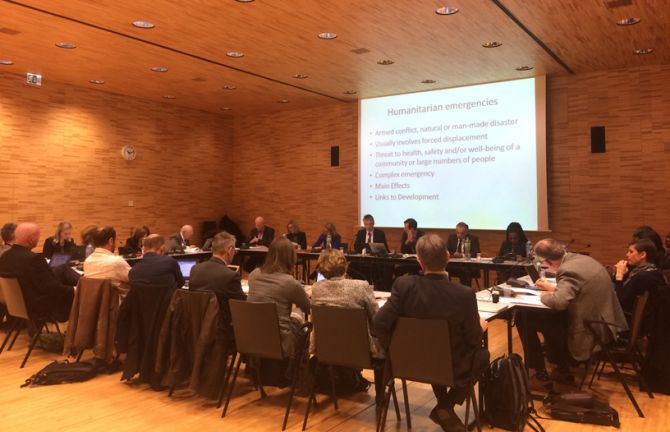
Update
HIV and humanitarian emergencies
04 March 2015
04 March 2015 04 March 2015Addressing the needs of the millions of people around the world affected by humanitarian emergencies will be critical to ending the AIDS epidemic by 2030, top experts agreed at a meeting held in Geneva, Switzerland, on 3 March.
Calling for a new way of addressing HIV in humanitarian emergencies, the experts examined ways to ensure that the specific needs of people affected by humanitarian emergencies are taken in to account as the response to HIV is fast-tracked over the next five years.
At the end of 2013, there were more than 51 million people worldwide who had been forcibly displaced, the highest number since the end of the Second World War. Many others facing humanitarian disasters remain at home but suddenly find themselves in fragile environments.
The links between HIV and humanitarian emergencies are complex. Vulnerability to the virus can be heightened because of, for example, greater exposure to sexual violence and more reliance on transactional sex to meet basic needs. In addition, health services and HIV intervention programmes may become much harder to access or even nonexistent.
The experts at the meeting, which was co-hosted by UNAIDS, the Office of the United Nations High Commissioner for Refugees and the World Food Programme, shared the latest evidence-informed insights, knowledge, experiences and data that support the inclusion of people affected by humanitarian emergencies in HIV programmes. These will be key elements for the upcoming 36th meeting of the UNAIDS Programme Coordinating Board in July 2015 which will have a special focus on HIV in emergency contexts.
Specific areas discussed included: obstacles to HIV programming in emergencies; identifying gaps and how to address them; coordination arrangements between different agencies; improving adherence to treatment; and tailoring HIV-related programmes to address a range of differing types of emergency.
Quotes
"Humanitarian emergencies present contexts of fragility, vulnerability and uncertainties. These are fertile contexts for HIV transmission. Addressing HIV in emergencies is not a matter of choice but rather a human rights issue. Populations affected by humanitarian emergencies must be central to the goal of ending AIDS. Innovation is key to achieving this outcome"
“We cannot end the AIDS epidemic by 2030 if we do not provide protection, care and treatment to people affected by emergencies. It is a matter of public health for people displaced by emergencies and those that host them. It is a basic human right. I believe finally there is the political will among the international community to address this issue.”
“With so much progress that has been made fighting the HIV epidemic, the need to prepare to maintain HIV support during emergencies and disasters is now more important than ever.”
“We are pleased to see the increasing focus on HIV in humanitarian emergencies, where risk and vulnerability to HIV is often increased. In particular, there is an urgent need to ensure the continuity of HIV prevention and treatment services for people living with and at risk of HIV in fragile and conflict affected states and during emergencies.”
Partners
Related

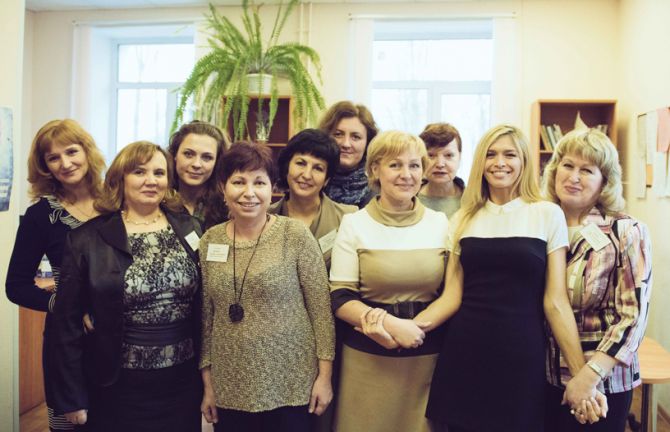

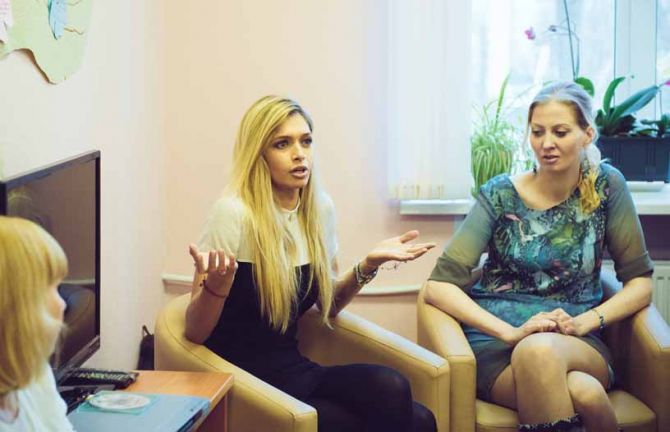
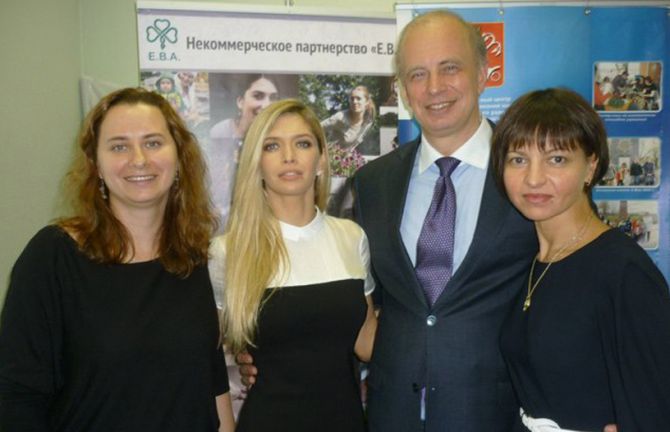
Update
Vera Brezhneva shows support for zero discrimination in Saint Petersburg
02 March 2015
02 March 2015 02 March 2015Vera Brezhneva, UNAIDS Goodwill Ambassador for Eastern Europe and Central Asia, has called for zero discrimination during a visit to a centre providing services for people living with HIV in Saint Petersburg, Russian Federation.
Ms Brezhneva visited the Centre for Social Services for Families and Children in the Krasnoselsky district of the city on the eve of Zero Discrimination Day on 1 March. One of the centre’s main goals is to provide social support for women living with HIV, as well as for their children and other family members.
The centre is part of a pilot project launched by the city of Saint Petersburg that aims to broaden support for people living with HIV. More than 260 people, including pregnant women, former prisoners and drug users, are benefiting from the centre’s services, which include peer-to-peer counselling, care and support.
Quotes
“I am deeply inspired by the people I met and their moving stories. This is a model centre that treats clients as human beings and addresses their situations without judgement but with practical support. I know anyone can face difficulties in life. We should never discriminate against anyone. We must be more tolerant and understanding of the challenges others face. I encourage everyone to show compassion and support, especially towards those living with HIV.”
“People living with HIV can now live a full and long life. HIV-positive pregnant women who receive early diagnosis and treatment can and must give birth to healthy children. We need to create conditions where no one will fear being tested for HIV, or fear condemnation and isolation for being HIV-positive, and where all people with HIV can access life-saving treatment as early as possible.”
“Removing stigma and discrimination is essential so that people living with HIV can maintain their health and take care of their children's future.”
“I have been living with HIV for 15 years. My husband is HIV-negative, and we have a healthy baby. This was possible thanks to the fact that I was not afraid to come forward to access antiretroviral treatment, work with health workers and take care of my own health.”
Region/country
Related

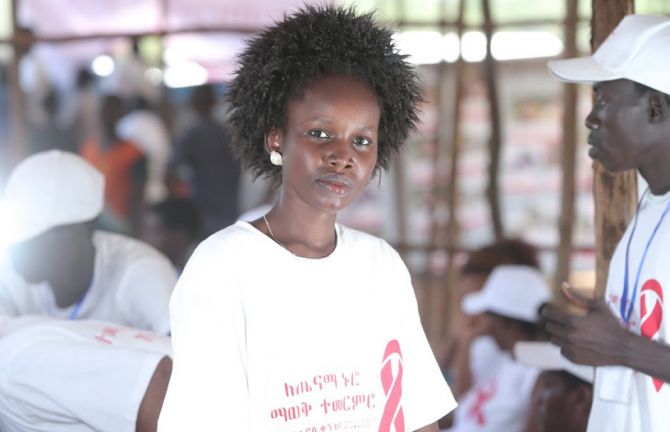
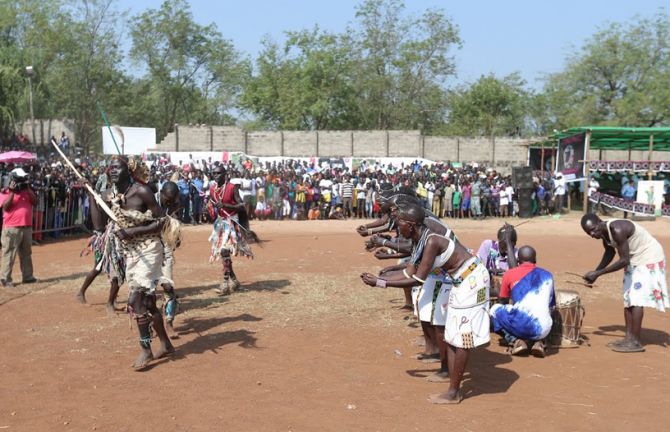
Update
Ethiopia sets new HIV testing Guinness World Record
20 February 2015
20 February 2015 20 February 2015Confirmation has recently been received that on 30 November 2014 a new Guinness World Record was set in Ethiopia. Over an eight-hour period some 3383 people were provided with voluntary HIV counselling and testing at the Gambella National Stadium in the Gambella region.
The HIV counselling and testing campaign was led by the Government of Ethiopia, in collaboration with UNAIDS, to commemorate World AIDS Day 2014. The aim of the HIV campaign was to mobilize communities in Gambella to find out their HIV status and to link them to HIV prevention and treatment services.
Television and radio advertisements were used to inform and mobilize participants. Also on board to encourage participation were community groups, the women’s army, religious leaders as well as the office of the President of Gambella.
According to the 2011 Ethiopia Demographic Health Surveys, the Gambella region is the most affected by HIV in the country, with HIV prevalence of 6.5% among the adult population. Several factors are attributed to the high prevalence rates in the region, including low levels of male circumcision among certain ethnic groups, migration flows and sex work in areas of commercial farming, mining and major roads connecting Gambella to western Ethiopia and South Sudan.
Qualified counsellors from around the country carried out the HIV counselling and testing. Participants who tested positive for HIV were given more information about the virus and referred to clinics providing HIV services.
The previous Guinness World Record was achieved on 30 November 2012 in Argentina, where 1380 people were tested in eight hours.
Quotes
“The HIV counselling and testing campaign in Gambella was a smart approach which will advance efforts to meet the 90–90–90 targets and end the AIDS epidemic in Ethiopia. As more people know their HIV status they will seek life-saving treatment”.
“Now I have a new life and a new safer beginning. I cannot change my result but the rest is in my control. I am determined to lead a protected life for me, my child and my husband.”
“I am delighted by our result and I understand this is just the beginning and we should keep the healthy life. I will put my heart, mind, and soul to protect myself and my girlfriend from infection.”
Resources
Region/country

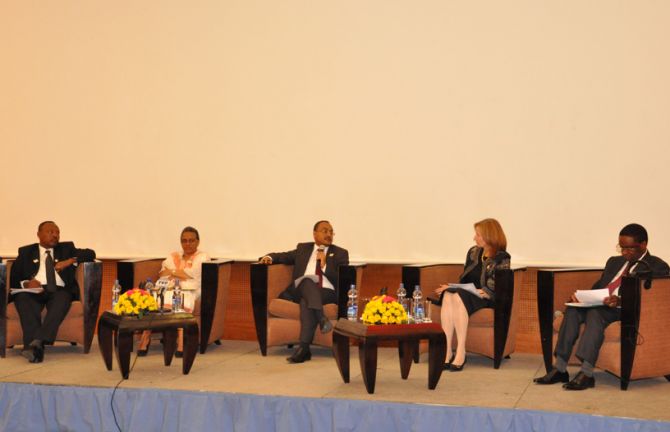
Update
Pink Ribbon Red Ribbon partnership launched in Ethiopia
12 February 2015
12 February 2015 12 February 2015Pink Ribbon Red Ribbon (PRRR), an innovative partnership that works to expand the availability of vital cervical cancer screening, treatment and breast care education—especially for women living with HIV—was officially launched in Ethiopia by Roman Tesfaye, the First Lady of Ethiopia, in Addis Ababa on 11 February.
HIV-positive women are four to five times more likely to contract cervical cancer than their HIV-negative peers. In Ethiopia cervical cancer is the second most-common female cancer and is responsible for 16.5% of all cancer deaths among women.
With US$ 7.8 million in funding, working under the leadership of the Federal Ministry of Health, PRRR will roll out programmes to prevent, screen for and treat cervical cancer at 33 sites across the country.
Founded in 2011 by the George W. Bush Institute, the United States President’s Emergency Plan for AIDS Relief, UNAIDS and Susan G. Komen, the partnership has helped to screen more than 100 000 women for cervical cancer in Botswana, United Republic of Tanzania and Zambia in the past three years.
UNAIDS has supported PRRR activities since the partnership’s inception, facilitating the active engagement of civil society and networks of women living with HIV in the implementation of PRRR activities. The lessons learned from the AIDS response have critical to decreasing the stigma and fear that can prevent women from seeking cervical cancer screening.
Quotes
“With a collective multisectoral collaboration among all stakeholders, prevention, control and treatment of cancer is within reach and under our control.”
“The partnership will draw from the progress that has been made over the past decade in the fight against HIV and AIDS.”
“UNAIDS commitment to Pink Ribbon Red Ribbon is an example of the importance of developing creative new models to better integrate HIV services with other primary health -care interventions in order to save lives and build sustainable health systems.”
Partners
Region/country
Related

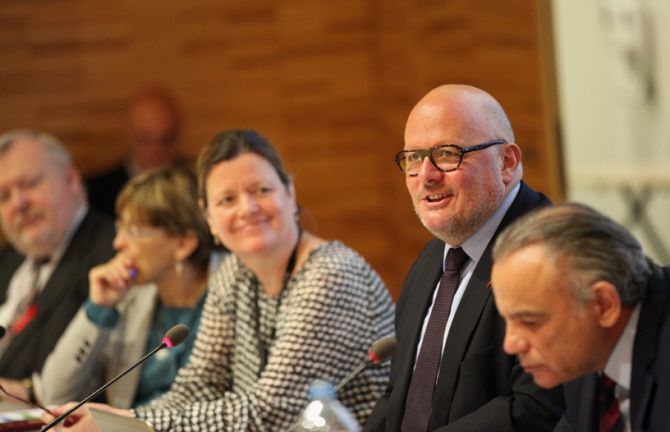
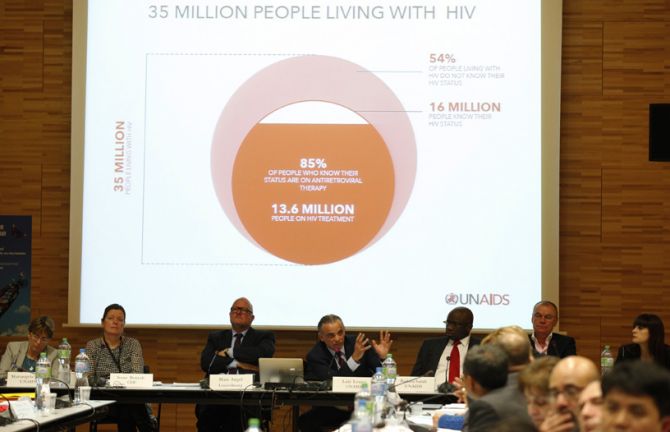
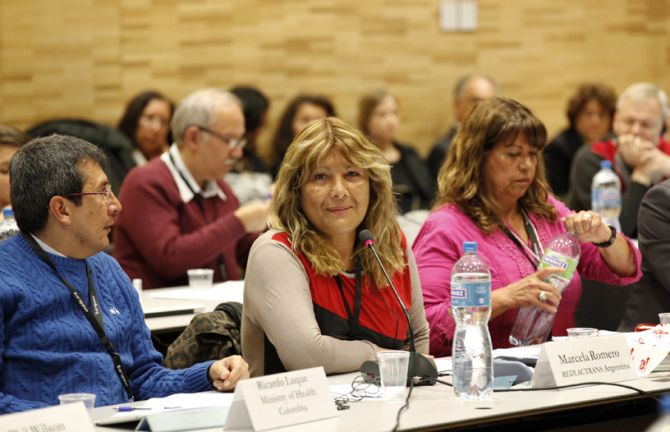
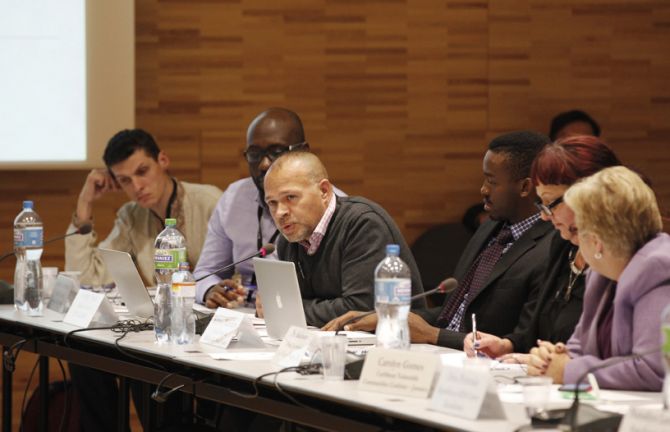
Update
Key populations global consultation on reaching the 90–90–90 HIV treatment targets
12 February 2015
12 February 2015 12 February 2015More than 100 stakeholders from around the world met at UNAIDS headquarters to develop recommendations to help realize the 90–90–90 HIV treatment targets. The ambitious targets by 2020 are to ensure that 90% of all people living with HIV will know their HIV status, 90% of all people with diagnosed HIV infection will receive sustained antiretroviral therapy and 90% of all people receiving antiretroviral therapy will have viral suppression.
The consultation focused on doing a better job of reaching populations at higher risk for HIV, including men who have sex with men, people who inject drugs, prisoners, sex workers and transgender people. The global consultation was held by UNAIDS, the Centers for Disease Control and Prevention and the Government of Luxembourg on 10 and 11 February in Geneva, Switzerland.
During the two-day meeting, participants worked together to identify the priority actions needed to ensure that all people are reached with HIV treatment. The participants identified common obstacles to HIV testing and treatment, such as stigma and discrimination, punitive laws, human rights violations and financing. The consultation also provided a platform to discuss solutions, best practices, promising innovations, critical enablers, potential game changers and priority actions to overcome service barriers and accelerate progress.
The meeting sought to provide the key elements for the construction of a global action agenda to accelerate access to treatment by key populations. These include improving strategic information on HIV among key populations, such as monitoring results across the cascade of care, and creating stronger links with and across the community, to ensure that community members have an active role in realizing 90–90–90. Participants also discussed supporting countries and other stakeholders to scale up rights-based HIV treatment and testing services for key populations and to eliminate structural barriers to service access.
Quotes
“Key populations have always mattered to UNAIDS, and they matter now more than ever. What matters is a lack of rights, a lack of inclusion and widespread discrimination. It is clear that we cannot take care of the AIDS epidemic without taking care of the needs of key populations. We need to focus on who is not getting treatment, where they are and why they are not benefiting from expanded treatment access.”
“What we are hearing at this meeting is that we need an ongoing platform to strengthen and coordinate work on bridging the treatment gap for key populations. We need to make sure that this isn't a single meeting that fails to lead to concrete progress in countries for key populations.”
“If there is one word I'd emphasize, it is community, community, community. The 90–90–90 target cannot be delivered without engaging the community.”



Update
President Kenyatta commits Kenya to take a leading role in the All In initiative to end adolescent AIDS
17 February 2015
17 February 2015 17 February 2015At the launch in Nairobi of All In, a new global initiative to end the AIDS epidemic among adolescents, President Uhuru Kenyatta announced that Kenya will lead by example by increasing domestic resources for the AIDS response and improving HIV prevention, treatment, essential health care and counselling services for adolescents.
President Kenyatta said the AIDS epidemic among adolescents threatened to rob Kenya of the promise of unprecedented growth and change in a context where Kenya has just reached middle-income country status.
He asked the Minister of Education to re-examine the national curriculum to better engage with young people living with HIV and to eliminate stigma and discrimination in schools.
He also asked for access to antiretroviral treatment for children and adolescents living with HIV to be improved rapidly. While 78% of adults living with HIV in Kenya have access to antiretroviral treatment, just 36% of children have access to the life-saving medicines.
The Deputy Executive Director of UNAIDS, Luiz Loures, who also attending the launch, said that UNAIDS is ready to work with Kenya to support its leadership on preventing new HIV infections among adolescents and ending the AIDS epidemic in Kenya. He emphasized that action has to be accelerated over the next five years if the AIDS epidemic is to be ended by 2030.
Quotes
“I have directed the ministries of education and health to initiate programmes that will ensure all HIV-positive children are provided with life-saving medication. The issue of children living with HIV not on antiretroviral therapy must be addressed without further delay.”
“I am heartened by President Kenyatta’s firm commitment to accelerating Kenya’s AIDS response. Only by fast-tracking our response to HIV over the next five years, will we be able to end the AIDS epidemic by 2030.”
Resources
Region/country
Related

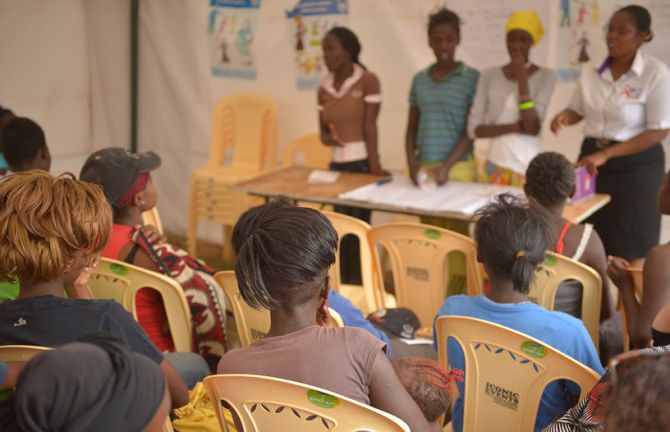
Update
Adolescents empowered by access to HIV prevention and care services in Nairobi
17 February 2015
17 February 2015 17 February 2015Representatives of some of the organizations involved in the global All In initiative visited the Korogocho Health Centre in Nairobi, Kenya, offering HIV prevention, care and counselling services to young people living with HIV or at higher risk of acquiring HIV.
The centre is based in Korogocho, an informal settlement that has a population of more than 150 000 people.
Established in 2012, it has registered more than 1100 adolescents aged 10–17 and offers tailored behavioural counselling as well as HIV prevention and care services. It uses a digital platform that includes an advice hotline and SMS messaging that provides information about its services.
Globally, HIV infections are not declining as quickly among adolescents as they are among other groups. AIDS-related illnesses are the leading cause of death for adolescents in Africa and the second leading cause of death among adolescents globally, second only to road traffic accidents.
Quotes
“Community counselling and care services such as those offered at this centre have an essential part to play in ending the AIDS epidemic among adolescents.”
“We can come here to learn more about HIV and how to protect ourselves from HIV and other diseases. People don’t judge you. And I just like spending time here with my friends as well.”
Related
 “Who will protect our young people?”
“Who will protect our young people?”

02 June 2025

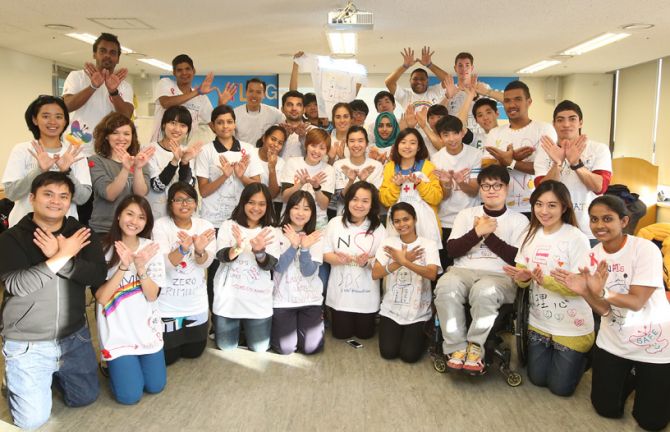

Update
Young leaders to promote HIV prevention through grass-roots sports activities
18 February 2015
18 February 2015 18 February 2015Young sports leaders from 15 countries in the Asia and Pacific region have learned about HIV prevention and sexual and reproductive health.
Some 30 volunteers participating in the Youth Leadership Programme of the United Nations Office on Sport for Development and Peace (UNOSDP), a programme designed to bring change in the volunteers’ homelands, attended a workshop in which they discussed how to talk about HIV with young people, explored ways to overcome the challenges faced by youth and debated the role of grass-roots sports activities in the HIV response.
As part of the workshop, held in the Republic of Korea, the youth leaders also designed and created innovative advocacy campaigns on HIV prevention and testing and on promoting zero discrimination, which they promised to implement in their home countries.
The workshop was led by UNAIDS youth officers and was organized by the Youth Leadership Programme of UNOSDP in partnership with Gwangju Summer Universiade Organizing Committee and the Youth Sport Trust.
Quotes
“Sport brings change and leadership in societies and can tackle the biggest challenges, including the HIV epidemic.”
“The day with UNAIDS taught me how to stand up for key affected people in my community by becoming an agent of change.”
“This is my second Youth Leadership Camp in the Republic of Korea and I am inspired by the activism spirit of the young leadership. I truly believe with leadership they can conquer anything.”
Region/country

Update
Update on Ebola in Liberia
16 February 2015
16 February 2015 16 February 2015Liberia is one of the countries dealing with the devastating effects of the Ebola epidemic. Walter Gwenigale, Minister of Health and Social Welfare of Liberia and Bernice Dahn, Chief Medical Officer from the Government of Liberia shared with UNAIDS some of the challenges the country is facing nearly a year after the outbreak first began in late March 2014.
While initially numbers of people infected were low, by July 2014 it became evident that Liberia was experiencing one of the most widespread outbreaks of the disease in the region. By August, 14 of the country’s 15 counties had reported confirmed cases and on 6 August 2014, the President of Liberia declared a three-month state of emergency.
Joint action between the government, international and national partners ensued and by September there were encouraging signs of an apparent decline in new infections.









